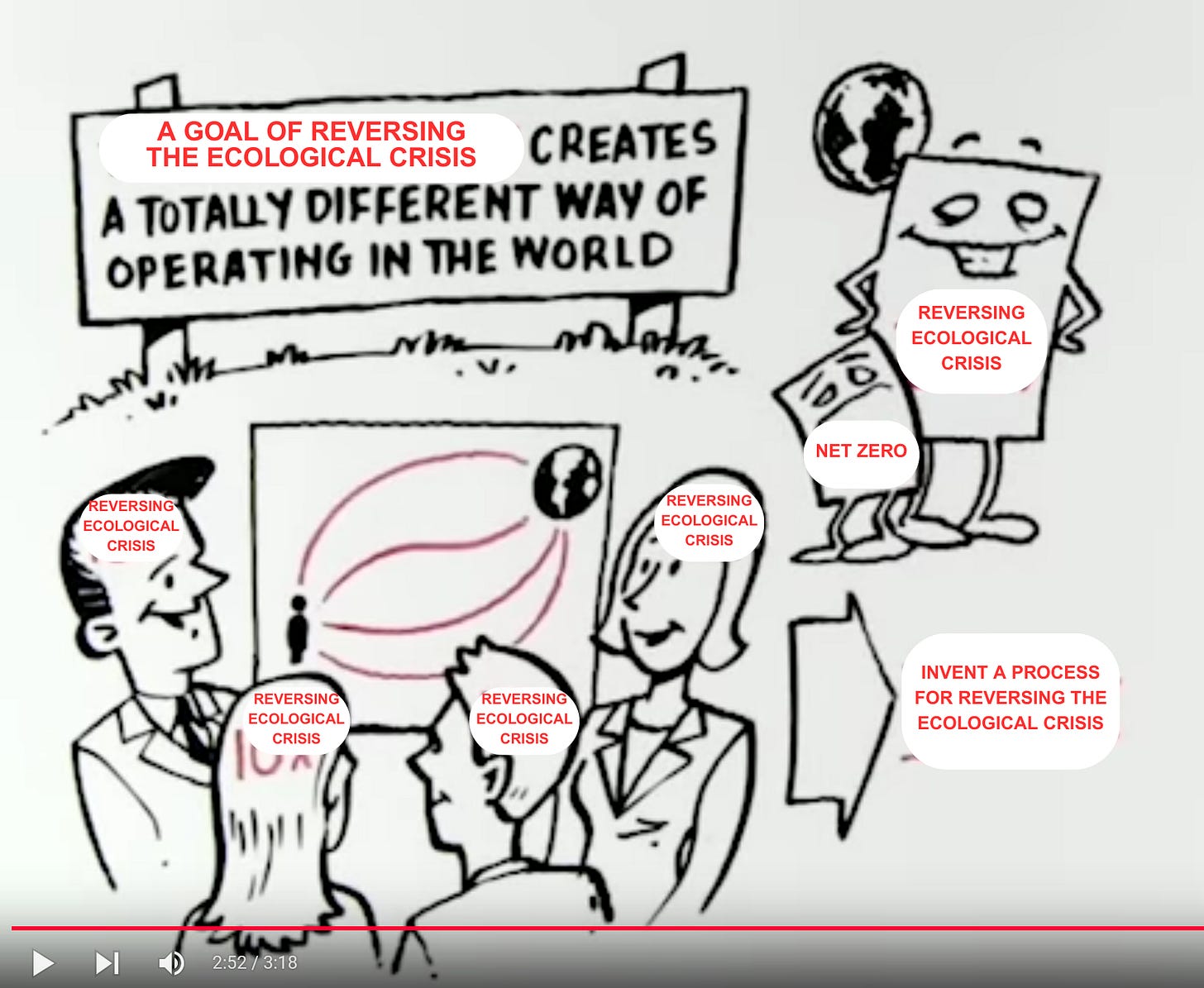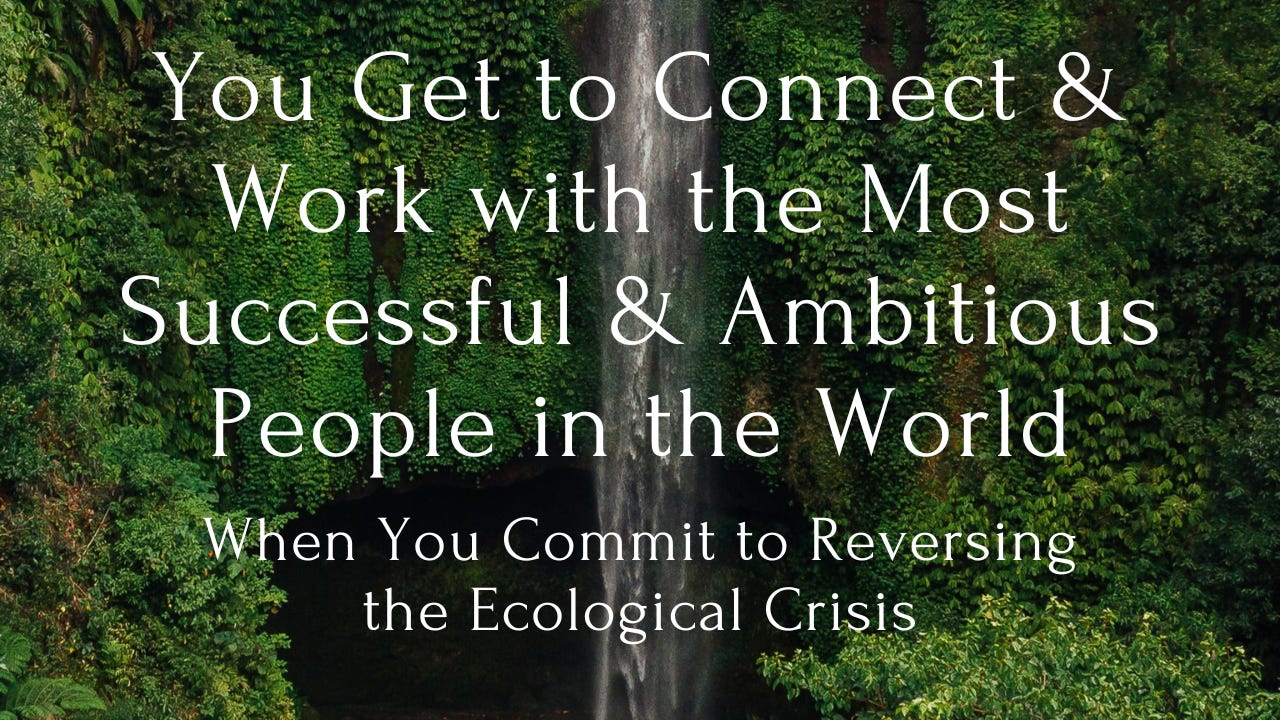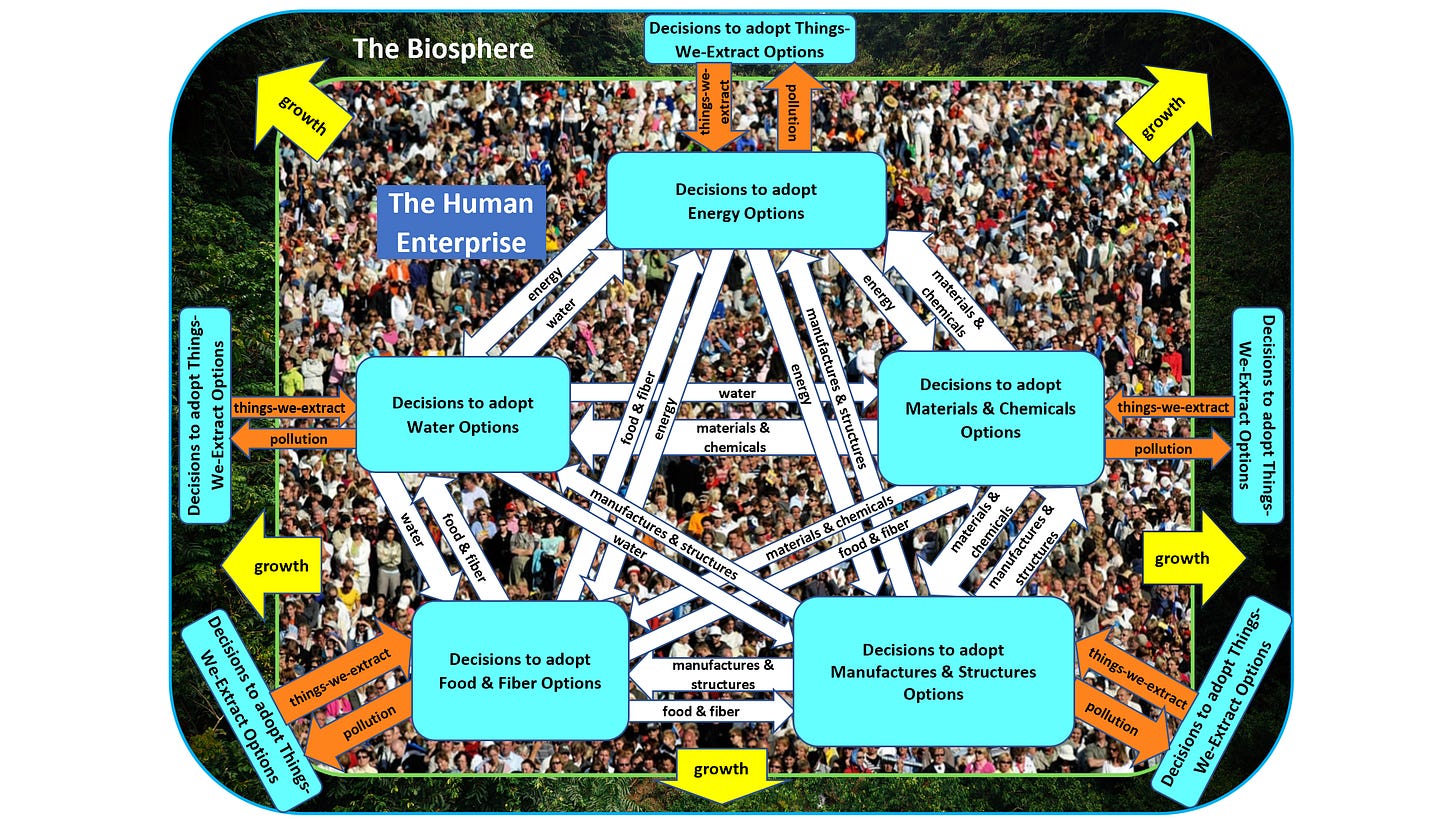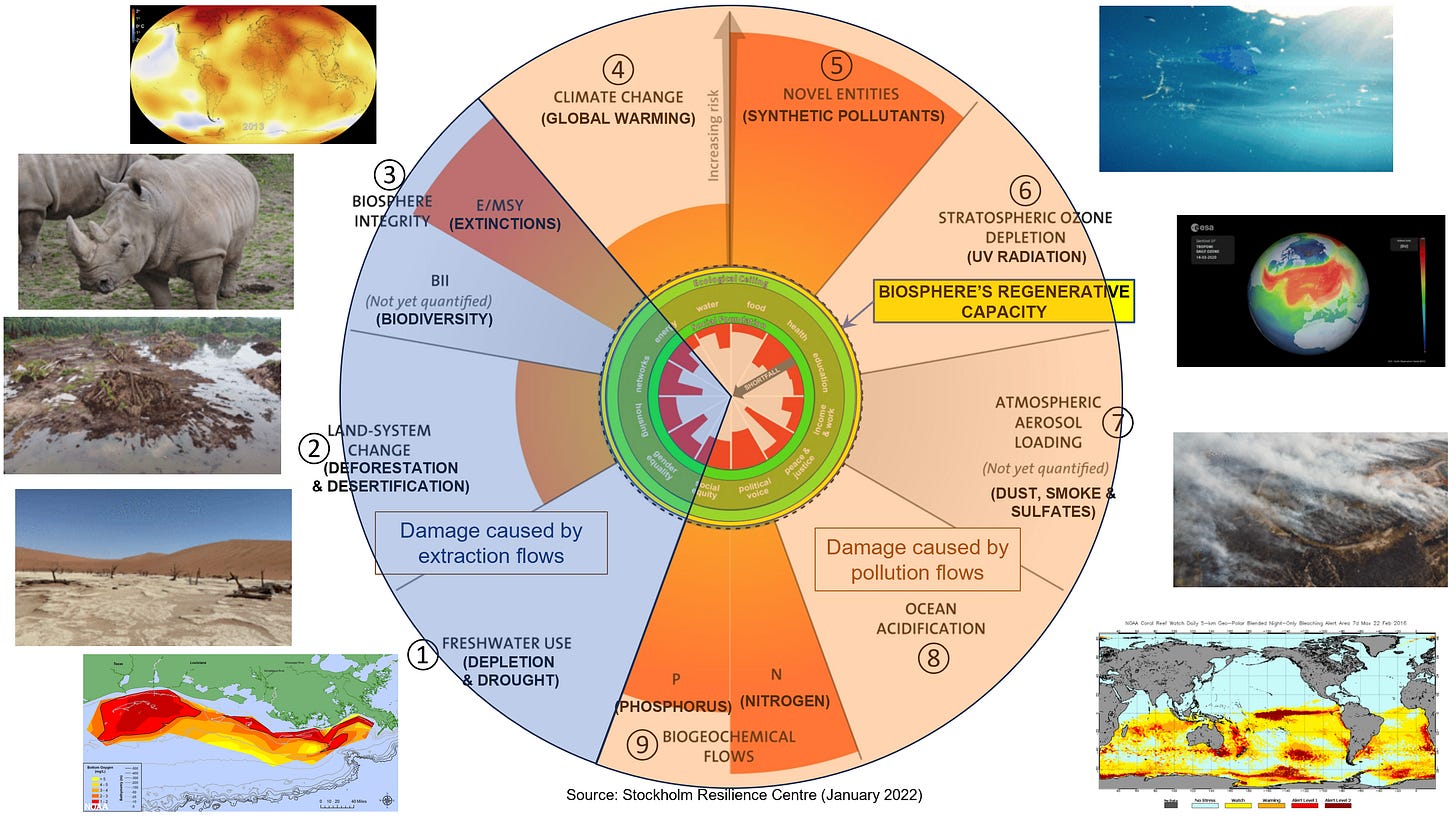You Get to Connect & Work with the Most Successful & Ambitious People in the World
When You Commit to Reversing the Ecological Crisis
Seemingly impossible or massive goals are highly practical because they immediately filter what works from what won’t, illuminating the few paths that have the greatest efficacy. – Dan Sullivan & Dr Benjamin Hardy
Human decision-making (in turquoise) is creating exponentially-growing things-we-extract flows and pollution flows (in orange) that are damaging the biosphere’s capacity (in deep green) for meeting the physical needs of all living beings, including human beings …
This damage to the biosphere is showing up as the sum of nine planet-scale ecological crises (the “Ecological Crisis”) created by humanity’s “overshoot” of “planetary boundaries” for human well-being …
Reversing the Ecological Crisis requires -- in the words of educator Stephen Covey – that we “begin with the end in mind.”
When we begin with the end in mind, reversing the Ecological Crisis requires, first, that we set a simple goal – understandable by people everywhere – of reversing the Ecological Crisis as a whole.
When John F. Kennedy declared in 1961 that:
… this nation should commit itself to achieving the goal, before this decade is out, of landing a man on the moon and returning him safely to Earth …
… he was setting a “seemingly-impossible goal” because, in the words of NASA Flight Director Chris Kraft:
When [Kennedy] asked us to do that in 1961, it was impossible.
John F. Kennedy said in his 1961 speech at Rice University:
We choose to go to the moon. We choose to go to the moon in this decade and do the other things not because they are easy, but because they are hard, because that goal will serve to organize and measure the best of our energies and skills, because that challenge is one that we are willing to accept, one we are unwilling to postpone, and one which we intend to win …
You don’t set a seemingly-impossible goal of landing a man on the moon – or reversing the Ecological Crisis – because it is easy.
You set a seemingly-impossible goal of landing a man on the moon – or reversing the Ecological Crisis – because it is hard.
You set a seemingly-impossible, hard-to-achieve goal – like landing a man on the moon or reversing the Ecological Crisis – to “organize and measure the best of our energies and skills” for inventing a process for achieving the goal.
A seemingly-impossible goal – like reversing the Ecological Crisis – is a practical goal because in the words of strategic coaches Dan Sullivan and Dr. Benjamin Hardy:
Seemingly impossible or massive goals are highly practical because they immediately filter what works from what won’t, illuminating the few paths that have the greatest efficacy. …
Seemingly impossible goals are more practical than possible goals because impossible goals force you outside your current level of knowledge and assumptions. …
A seemingly-impossible-but-practical goal of reversing the Ecological Crisis as a whole:
forces one to go outside one’s current level of knowledge and assumptions about the Ecological Crisis, and
frees one to immediately filter what works from what won’t, for inventing a process for reversing the Ecological Crisis.
Reversing the Ecological Crisis is a practical goal[1] because it’s a lot easier to achieve a seemingly-impossible goal (like reversing the Ecological Crisis as a whole) than it is to go for a “possible goal” (like “net zero” for stabilizing greenhouse gas concentrations in the atmosphere[2]).
It has to do with what immediately happens to your thinking, your innovation, your decision-making, your communication and your action the moment that you fix your brain on a seemingly-impossible goal like reversing the Ecological Crisis.
The moment someone seriously commits themselves to a seemingly-impossible goal of reversing the Ecological Crisis, they visualize where they want to be. And intellectually they engage with inventing a process for reversing the Ecological Crisis.
Not only that, they’ve emotionally committed themselves to making the decisions and taking the actions and communicating in a way that actually achieves the seemingly-impossible goal of reversing the Ecological Crisis.
Before you had the seemingly-impossible goal, your mind was on everything. But once you make the commitment and you visualize reversing the Ecological Crisis, your brain immediately starts filtering what works from what won’t for inventing a process for reversing the Ecological Crisis.
Your brain looks at everything that people are doing right now – all the paths and strategies and options for dealing with the Ecological Crisis or any of its component ecological crises (like the climate crisis). And it begins to say, “this works for reversing the Ecological Crisis,” so you keep it.[3]
And your brain says, “that doesn’t work for reversing the Ecological Crisis,”[4] so you’re going to have to stop doing it.[5] You’re going to have to eliminate it from your work flow, or you’re going to have to give it to somebody else. You might delegate it or outsource it, but you’re not going to do it any more.
The criteria that you’re using to make all these decisions is, “Does it work for reversing the Ecological Crisis?” or, “Does it not work for reversing the Ecological Crisis?”
It’s easier to achieve a seemingly-impossible goal – like reversing the Ecological Crisis -- than a possible goal – like “net zero” -- because the seemingly-impossible goal frees your brain to immediately filter what works from what won’t for inventing a process for reversing the Ecological Crisis.
Intellectually engaging and emotionally committing to a seemingly-impossible goal -- of reversing the Ecological Crisis -- creates a totally different way of operating in the world.
When you commit to a seemingly-impossible goal – of reversing the Ecological Crisis -- you become connected to the most successful & ambitious people in the world who want to apply “the best of [their] energies and skills” and want to work with you for reversing the Ecological Crisis.

They won’t do it if you’re going for a possible goal – like “net zero.”[6] The most successful & ambitious people in the world are interested in seemingly-impossible goals like reversing the Ecological Crisis, not possible goals like “net zero.”
How do you want to feel about connecting & working with the most successful & ambitious people in the world for reversing the Ecological Crisis?
How do you want to feel about being one of the people who actually makes it happen?
When you commit to a seemingly-impossible goal of reversing the Ecological Crisis, you get to connect & work with the most successful & ambitious people in the world for reversing the Ecological Crisis.
To receive new posts and nourish my work,
please consider becoming a free or paid
subscriber to my Substack channel @Thank you for reading Solving the Eco-crises. If you enjoyed this post, feel free to share it @
Peace and Aloha!
Erik
[1] This analysis is adapted from Dan Sullivan’s video, “Why Growing 10x Is Easier Than Going 2x.”
[2] “Net zero” is a “possible goal” because it’s possible that institutions will honor their net zero pledges and possible that institutions honoring those pledges will stabilize greenhouse gas concentrations in the atmosphere. In fact, “net zero” has failed to stabilize greenhouse gas concentrations in the atmosphere.
[3] For example, “rewilding” works for reversing the Ecological Crisis as a whole.
[4] My article, “What if the Planet is Trying to Save Us?” lists problem-solving disciplines that have not yet invented a workable process for reversing the Ecological Crisis.
[5] In the words of Michael Dunlop, “You’ve got to stop doing all the things that people have tried, tested, and found out don’t work.”
[6] Possible goals – like “net zero” for stabilizing greenhouse gas concentrations in the atmosphere – have failed because they have not been hard-enough, unrealistic-enough and impossible-enough to attract & challenge the energies and skills of the most successful & ambitious people in the world.
P.S. I cross-posted this article on Medium for greater reach.




